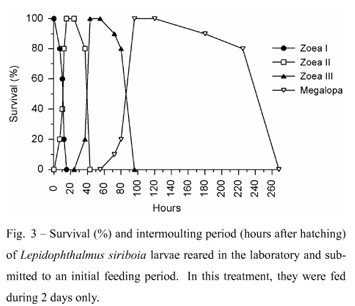Food supply is considered critical for a successful culturing of decapod larvae. However, some species may present yolk reserve sufficient to complete their larval development without external food supply (known as lecithotrophic larval development). In the present study, two experiments were carried out in order to verify whether the callianassid Lepidophthalmus siriboia have lecithotrophic behaviour or, if they need external food for their larval development: Experiment 1, larvae submitted to an initial feeding period and Experiment 2, larvae submitted to an initial starvation period. High survival rate was observed in both experiments, in which only 2 megalopae and 1 zoea III died. These results strongly suggest that larvae of L. siriboia are lecithotrophic as they have sufficiently large yolk reserve to complete their larval development, while the megalopa stage shows facultative lecithotrophy. The larval periods of each stage of the treatments were quite similar and, despite some significant differences in some larval periods, these can be related probably to larval rearing conditions, abiotic factors or, individual variability of larval health, as well as stress caused to the ovigerous females during embryogenesis.
behaviour; Callianassidae; larval development; lecithotrophy; Lepidophthalmus siriboia; starvation










